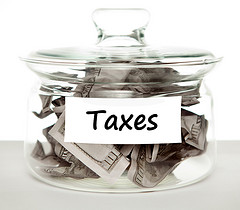 |
On only a few rare occasions does it make sense to defer money to your 401(k) or other employer sponsored plan instead of a Roth IRA. Those occasions include when your gross income excludes you from contributing directly to a Roth IRA (you can still convert), you are currently at a very high tax rate or the case of when you live in a state where retirement income is excluded from state taxation.
Here in Illinois, the current law exempts retirement income from being taxed at the state level. What this means, is that any contributions to a 401(k), 403(b), SEP, SIMPLE and 457 avoid state income taxation. Qualified distributions at retirement are only taxed at the federal level, and then only as income.
If you contribute directly to a Roth IRA that money is after-tax money going in. After-tax in this case meaning it’s been already taxed at the federal and state level. So in this case the money going into the Roth IRA has been “hit twice” with federal and state taxes.
One possible way to avoid this double whammy (going by current Illinois law) is to contribute to your employer’s plan and then at retirement or whenever you leave your job, convert that money to a Roth IRA. In this case the money from your paycheck is already deferred from state taxation and then when it’s converted to a Roth IRA, avoids state income taxation again – since it’s income from a retirement plan and considered retirement income – which Illinois does not tax. This is evidenced by the 1099-R you’ll receive at the time of conversion.
Another way to avoid this is if your employer’s plan allows, convert your 401(k) to a Roth 401(k) while you’re still employed. Again, you’ll pay federal income tax but avoid the state taxation if your state excludes retirement income for tax purposes. If you’re in a higher tax bracket, you may consider staging your conversions up to the point where you maintain low tax costs (converting small amounts over many years). Or you may just want to wait to convert the whole amount when you know you’ll be in a lower tax bracket.


 Sterling Raskie, MSFS, CFP®, ChFC®
Sterling Raskie, MSFS, CFP®, ChFC® The latest in our Owner’s Manual series, A 401(k) Owner’s Manual, was published in January 2020 and is available on
The latest in our Owner’s Manual series, A 401(k) Owner’s Manual, was published in January 2020 and is available on  A Medicare Owner’s Manual, is updated with 2020 facts and figures. This manual is available on
A Medicare Owner’s Manual, is updated with 2020 facts and figures. This manual is available on  Social Security for the Suddenly Single can be found on Amazon at
Social Security for the Suddenly Single can be found on Amazon at  Sterling’s first book, Lose Weight Save Money, can be
Sterling’s first book, Lose Weight Save Money, can be  An IRA Owner’s Manual, 2nd Edition is available for purchase on Amazon. Click the link to choose the
An IRA Owner’s Manual, 2nd Edition is available for purchase on Amazon. Click the link to choose the  Jim’s book – A Social Security Owner’s Manual, is now available on Amazon. Click this link for the
Jim’s book – A Social Security Owner’s Manual, is now available on Amazon. Click this link for the  And if you’ve come here to learn about queuing waterfowl, I apologize for the confusion. You may want to discuss your question with Lester, my loyal watchduck and self-proclaimed “advisor’s advisor”.
And if you’ve come here to learn about queuing waterfowl, I apologize for the confusion. You may want to discuss your question with Lester, my loyal watchduck and self-proclaimed “advisor’s advisor”.
Does Illinois exempt the retirement income regardless of age?
I know in some states you must be age 59 1/2 before the state income tax exemption kicks in.
Hi Clyde,
According to Publication 120 from the IL Department of Revenue, you may include early distributions from qualified plans and IRAs in the amount subtracted from your IL-1040, line 5. This means early withdrawals are also excluded from state income tax in IL.
Thanks!
sr
Yes. Amazing as it sounds, pretty much all retirement income is exempt from IL state income tax.
No wonder we’re in so much trouble – well, the corruption thing too – but still! :)
jb